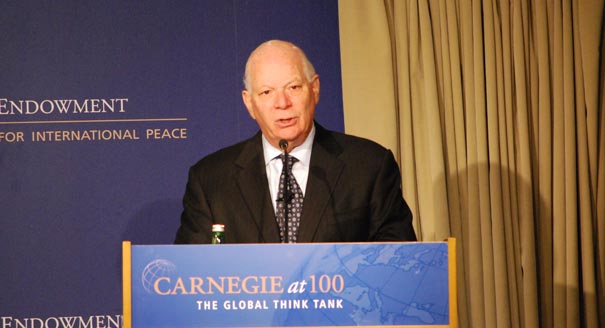Registration
Thank you!
You will receive an email confirming your registration.
Despite the many achievements of the U.S.-Russia “reset,” Russia’s centralized political system and troubling domestic issues limit the growth of the bilateral relationship. In his keynote address at Carnegie, Senator Ben Cardin discussed the political and human rights situation in Russia and the role of human rights issues in shaping U.S.-Russia relations. Following his remarks, Angela Stent of Georgetown University, Carnegie’s Lilia Shevtsova, and Dorothy Dwoskin of Microsoft commented on the future course of U.S.-Russia relations. Carnegie’s James F. Collins moderated.
The Human Rights Dimension
- Importance of Human Rights: Human rights are an integral part of national and international security, Cardin argued. Respect for citizens’ rights is just as vital to maintaining peace and stability as economic and military security, he added. “You can’t have security without a commitment to human rights,” he stressed.
- Sustainable U.S.-Russia Relations: A “basic commitment to transparency” should form the foundation of U.S. relations with other countries, including Russia, Cardin said. However, he added that Russia suffers from “gross corruption” and weak protection of human rights, especially for journalists and opposition figures. While Russia is an important strategic partner, the United States must “stand up and point out the problems that they [Russians] have today” in order to maintain a normal relationship, he concluded.
- The Magnitsky Bill: Although Cardin’s bill—which enjoys broad bipartisan support—seeks to publicly condemn Russian officials involved in the 2009 death of Russian lawyer Sergei Magnitsky, he described it as a “pro-Russian” initiative. Freezing Russian human rights violators’ assets and denying them entry to the United States would “hit them where it hurts,” he argued. The goal is to highlight human rights issues in Russia and force the Russian leadership to “hold those responsible accountable,” he said.
- Repealing Jackson-Vanik: The 1974 Jackson-Vanik Amendment, which limited trade between the United States and the Soviet Union due to Soviet restrictions on Jewish emigration, has outlived its purpose, Cardin argued. As Russia prepares to join the World Trade Organization in 2012, he said that the United States should seek to restore “permanent normal trade relations” by substituting the Magnitsky Bill for Jackson-Vanik.
The United States, Russia, and Beyond
- A Love-Hate Relationship: U.S.-Russia relations consist of many “contradictory elements,” Stent argued. Even though Putin sees NATO as a “cold war relic,” he still believes that meaningful cooperation is possible, especially in regards to the war in Afghanistan.
- Impact of Magnitsky Bill: Stent questioned whether targeted legislation against Russia would be effective, suggesting that broader legislation could serve as a “true heir” to Jackson-Vanik. She noted that negotiations behind closed doors rather than public humiliation could achieve the best outcome. Threats against Russian officials will likely cause the Russian leadership to retaliate, she concluded.
- Russia’s WTO Accession: Russia’s membership in the WTO will allow both sides to “take the relationship to a new level,” Dwoskin noted. Although Russia represents a large market with a highly educated workforce, she added that Russia has not fully developed the “essential ingredients” such as rule of law and transparency that facilitate best practices. Nevertheless, strengthening economic cooperation will help improve the broader U.S.-Russia relationship, she concluded.
- Under the Spotlight: The world’s attention will be on Russia as it hosts the 2012 APEC Summit, the 2013 G-20 Summit, the 2014 Winter Olympics, and the 2018 World Cup, said Dwoskin. Russia must therefore demonstrate that it is serious about joining the WTO and adhering to international standards.
Perspectives from Russia
- The Meaning of Magnitsky: Shevtsova praised Senator Cardin’s legislation, which she said pressures non-democratic elites in Russia and elsewhere to “follow civilized rules of the game.” The bill, she argued, seeks to restore the U.S. role as a “normative power” and could serve as a warning to members of the “service class” who enable non-democratic and corrupt elites to freely pursue their interests in the West.
- Washington’s Choice: Nearly all those opposing the Kremlin, including Russian liberals and broader segments of civil society, view the “reset” with “great suspicion” because it appears to legitimize Putin’s government, Shevtsova noted. The “‘reset’ has been the U.S. rapprochement with the Russian political regime at the expense of society,” she argued. Moving forward, the United States must decide whether to maintain good relations with the Russian state or reach out to the “new Russia” that opposes Putin.
- Putin’s Strategy: Putin has pursued a foreign policy that is simultaneously aligned with and against the West, Shevtsova noted. Putin’s regime, she added, in the situation where it loses legitimacy and credibility, will continue to promote the idea of “Russia as a besieged fortress” under attack from internal and external enemies.
- Prospects for Modernization: Despite optimism outside of Russia that a reform-minded “Putin 2.0” could emerge, Shevtsova argued that Putin’s regime is not ready to open the door to more competition at this stage. Moreover, political reformers must be prepared to challenge elites’ vested interests, added Stent. Shevtsova suggested that a dramatic revolution from below rather than top-down reform may be necessary to alter the status quo.
